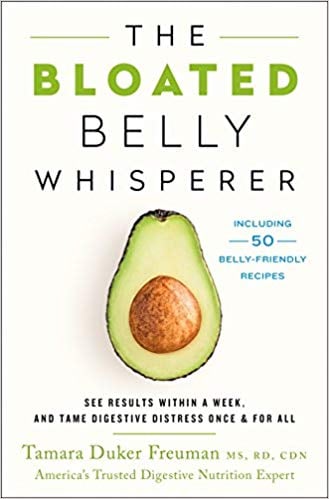My Experience As A Digestive Health Journalist
As a registered dietitian who works in a gastroenterology practice and writes extensively about digestive issues, I’m often contacted by journalists and magazine writers to be interviewed.
In the fall, the discussion is often geared to “beating the holiday bloat,” whereas in the spring,
I’m commonly asked about which “flat belly foods” can help people whittle down a waistline. More recently, there’s been a lot of interest in which foods can conquer a bloated belly by “balancing the gut microbiome.”
Common Advice Given
Whether I’m interviewed for such pieces or not, I’ve noticed that they typically produce similar advice on the topic of beating bloating, and increasingly predictable platitudes around flattening a belly.
Perhaps you’ve heard some of them? Drink more water. Consume less sodium.
Add ‘flat belly’ foods to your diet like asparagus, watermelon or fill-in-the-blank. Drink hot water with lemon first thing in the morning. Take a probiotic supplement. Take a shot of apple cider vinegar. Eat cultured and fermented foods.

Simple Answers Are Not Always The Best Answer
Having literally just written THE book on bloating, however, I can tell you that such simplistic remedies are unlikely to help someone who is truly bloated. How can such oft-repeated advice be so off the mark? I think the issue lies in a single mistaken assumption: that all bloating has a common cause. It doesn’t.
True bloating in a clinical sense originates in the digestive system—the stomach, small intestine, colon or some combination thereof—and there are numerous medical reasons that can be behind it. Other things that folks commonly refer to as “bloating” but which don’t have their origins in the digestive tract are not actually bloating.
What Is NOT Actually Bloating?
Take, for example, those times when your face, fingers, legs or belly appear “puffy” the day after eating too much sodium or drinking too much alcohol. When this happens, you’re actually just retaining water; it has nothing to do with your digestive system.
Assuming your kidneys function well, this puffiness is temporary and will typically recede within a day. If this is your issue, then avoiding sodium and laying off the booze will certainly help prevent your swelling up with excess fluid in the future.
You Just Ate Too Much!
Another condition that’s commonly conflated with ‘bloating’ is when your waistline has expanded after an indulgent and sedentary holiday season. Here, too, I’m afraid that your belly may not necessarily “bloated.” You’ve simply gained weight.
As such, your waistline will shrink upon losing weight by any means effective for you; no single ‘superfoods’ can accelerate this process or achieve a ‘flat belly’ appearance without accompanying weight loss.
True Bloating
In contrast, true “bloating” refers to a distended appearance of your abdomen and/or a feeling of abdominal discomfort or fullness that implies a problem inside the gut. The most common causes of bloating that I see in my clinical practice include:
- Having excess gas or stool inside your digestive tract—which can be caused by a variety of conditions;
- Having hyper-sensitive nerves in your digestive tract that send signals of discomfort even in response to normal amounts of gas, stool or food passing through;
- And/or having abdominal muscles that respond abnormally to the passage of food, drink and gas through the digestive tract.
1 in 6 Americans Experience Bloating
If you’re among the one in six Americans who regularly experiences abdominal bloating, then, you can imagine that drinking more water or eating asparagus every day isn’t likely to be a simple fix to this complex problem. Probiotics aren’t necessarily a silver bullet, either.
Some causes of bloating are purely ‘mechanical,’ and have nothing to do with the balance of micro-organisms living in your gut; like for example, when the abdominal wall muscles completely relax and give out in response to anything you ingest…even sips of water.
Other Reasons for Bloating
Other types of bloating are actually caused by having too many bacteria in the small intestine, meaning that pills full of more bacteria could make things worse, not better. A generic solution that’s not tailored to your problem is hardly a solution at all.

Find The Cause Of Your Bloating
The right remedies for your bloating will depend on identifying the actual cause of your bloating so that a solution can be individualized. Sometimes diet alone can solve the problem.
Sometimes other behavioral changes—such as modifying your meal patterns or even your bathroom habits—will hold the key to relief.
In some cases, only medication or physical therapy will do the trick. In my experience, when someone’s been struggling for awhile with bloating, it often takes some combination of interventions to provide lasting relief.
Moreover, what’s worked for your mom, someone you follow on Instagram or your trainer with the abs of steel may or may not work as well for you, no matter how much they swear by it.
“Backed-up Bloating”
For example, if your bloating is caused by constipation—or what I refer to in my book as “backed-up bloating,” then remedies that alleviate the constipation will be what it takes to alleviate the bloating.
Drinking water seldom cuts it; to find a lasting solution, you may need to look at a multi-pronged solution that includes your diet, meal patterns and possibly also supplements or medications that have a laxative effect.
If such changes still don’t work, you may need to have a doctor evaluate your pelvic floor muscle function to make sure your body has the mechanical wherewithal to effectively pass stool.
Bloating From Too Much Gas
If your bloating is caused by having too much gas in the digestive tract, then your solution will need to focus on figuring out where all this gas is coming from. Are you swallowing it, resulting in constant attacks of belching alongside your bloating? Is the gas being produced in your stomach from chemical reactions between high levels of stomach acid and the food you eat?
Are Lactose or Fructose Your Problem?
Do you have a problem absorbing natural sugars like lactose or fructose, in which case you find yourself inflated and farting up a storm four to eight hours after consuming a food that contains these sugars?
Are you overgrowing bacteria in your small intestine, in which case you might start to fill up with gas within thirty to sixty minutes of eating a variety of healthy foods—commonly known as “high FODMAP” foods– that gut bacteria love to feast on?
These are but a few of the causes of gas-related bloating that I outline in my book—each of which requiring a different remedy.

The Devil Is In The Details
Once in a while, effective solutions for bloating can indeed be quite simple, as in the case of “sour stomach bloating” whereby simply eating something small every three hours can have a huge impact on post-meal bloating, or in the case of mild constipation in which adding a simple magnesium supplement before bed gets your bowels moving regularly and helps you feel great.
But often, the solution will be more multi-pronged, and may defy a simplistic, silver-bullet remedy. To fix bloating once and for all, the devil is usually in the details, and the oversimplified, one-size-fits-all conventional wisdom often falls short.
Editor’s Note: This article represents the experience and expertise of the author. At FODMAP Everyday® contributors are chosen for their unique voices, expertise and their credentials if they are sharing medically based information. Our goal is to educate you, the consumer, so that you can make informed decisions about your own health care.
This post may include affiliate links. Please see our complete disclosure here.
Do you suffer from bloating? Tired of trying to figure it out on your own?
Check out Tamara Duker Frueman MS, RD, CDN’s book The Bloated Belly Whisperer:See Results Within a Week and Tame Digestive Distress Once and for All
America’s trusted digestive nutrition expert shares her personal program to vanquish bloating in a groundbreaking book that will help readers see results in a week or less!
With 50 recipes from former Bon Appétit editor and cookbook author Kristine Kidd
Bloating: ugh. About the most common complaint they get from patients, according to gastroenterologists. But Tamara Duker Freuman, a highly trained and sought-after nutritionist, knows something many doctors don’t: every unhappy belly is unhappy in its own way. That’s why Tamara’s clients call her “The Bloated Belly Whisperer,” and for good reason―for many years she’s successfully helped her clients accurately describe their symptoms, and find a course of treatment that delivers rapid and lasting relief.
In The Bloated Belly Whisperer, Tamara guides readers through the same steps she would use in a consultation, first with a quiz to help them hone in on their specific symptoms, and then by discussing the latest research and patient stories to offer dozens of solutions that will reduce abdominal bloating in a week or less by:
· Helping identify the specific cause of bloating
· Equipping readers with the right terminology and questions to take to their next doctor’s visit
· Teaching the most effective dietary remedies for each particular brand of bloating
· Laying out the tools and healthy practices to end abdominal distress and bloating once and for all
Reviews
“This book could be a game-changer for anyone suffering from chronic belly upset…a deliciously do-able plan to keep you happy, healthy and bloat-free.” –Ellie Krieger, MS RD, host of Ellie’s Real Good Food, and award-winning cookbook author
“With candor and science-based expertise, Freuman offers invaluable information for readers suffering from a range of debilitating digestive issues.” — Publishers Weekly, starred review
Read All Of Tamara’s Articles:
- What Conventional Wisdom Gets Wrong About Bloating
- Timing of Digestive Symptoms: What It Means
- What Is Leaky Gut Syndrome?
- Are You Full of Sh*t? Stool Burden and the Low FODMAP Diet
- Everything You Want to Know About Farting*
- 5 Reasons to Skip Gut Microbiome Testing – For Now
- Exclusive Interview with Dietitian Tamara Duker Freuman
- Q & A With The Author Of “Regular, The Ultimate Guide to Taming Unruly Bowels and Achieving Inner Peace”









I notice you have a lot of beef recipes. But I’ve also noticed that eating beef, lamb and pork seems to aggravate my IBS symptoms. When I google “Beef IBS” I get a WebMd article that says: “According to the American Academy of Gastroenterology, IBS patients had higher levels of an antibody called IgG4 in response to five foods, compared with those without IBS. Those five foods were wheat, beef, lamb, pork, and soybeans.”
Any thoughts on this?
High fat foods– including/especially higher fat (red) meats like beef, lamb, and pork– can be an IBS trigger for many, though this typically has to do with the effect that dietary fat has on hormones that (over)stimulate the intestines’ motility and can cause cramping, urgency or pain. It does not have to do with the immune system and is not mediated (carried out) by immune cells like IgG antibodies. IgGs are actually a marker of food TOLERANCE and not intolerance, and there is no science to date that backs up the belief that IgG antibodies are predictive of food sensitivity. I’ve written more about IgGs here: https://www.self.com/story/food-sensitivity-testing-kits
Hope this helps!
I get bloated after having gluten free cereal for breakfast even though I’m not gluten intolerant. I have a fructose malabsorption problem. Nothing seems to work. Nothing can be pin pointed either, just happens n stays for about a week. Take probiotics n Kifir already.
So many possibilities! Gluten free cereals can be formulated with a variety of high FODMAP (gas-creating) ingredients. Common ones include inulin (or chicory root fiber), soy protein concentrate, soy flour, other bean flours, fruit juice concentrates, honey, agave nectar, invert sugar, dried fruits… any of these show up on the ingredient label? Then there’s the milk you’re using for the cereal… regular dairy or lactose free? a plant-based milk thickened with various gums? In cases like these, you’ll need to consider all the possible culprits, though one thing you can say for sure: it’s not the gluten!
(Dédé’s addendum: this is a perfect example of a situation that needs someone like Tamara working with the patient. Working with a Registered Dietitian could be the trick to untangling a more complex presentation. We always suggest that those struggling with their IBS symptoms find a qualified professional to work with.)
I suffer with IBS on a regular basis on the constipation side however I go regularly. I would like to find a dietitian nutritionist in my area and have not been successful can you make recommendations or a suggestion on how I go about finding someone in my area? Thank you so much for your help.
Hi Lunette, (love your name BTW). You can refer to our International RD Directory. Many RDs will even do Skype and phone sessions, so think broadly. It can be a hard search, because you want to find the right match, and you have to find a RD who can legally service you where you live. Don’t give up! It can be done! Just might take a bit of legwork.